Benjamin Buchanan
Assistant Professor of Teaching and Director of External Education and Outreach — Security Studies
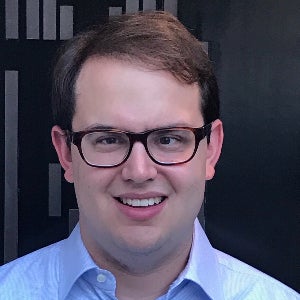
Dr. Benjamin Buchanan (COL‘11, SSP‘13) is no stranger to the Hilltop, holding two degrees from Georgetown. “I’m delighted to be back at a place that merges theory and practice so effectively,” Buchanan says. “For me, the SFS has always been a place where the nuance of theory can be tested against the practicalities of policy.” He also has a Ph.D. in War Studies from King’s College London, and was formerly a Postdoctoral Fellow at Harvard Kennedy School of Government’s Belfer Center for Science and International Affairs.
Focusing on cybersecurity, Buchanan hopes to look particularly at the role of hacking in international affairs, and to help establish Georgetown as the place to study these crucial topics. “I’ve spent a lot of time thinking about how nations project power by hacking one another, and about what that means for the future of geopolitics,” Buchanan says. “That will certainly be a theme of my work in the SFS, especially as it relates to offensive cyber operations and the increasing importance of AI.”
Buchanan is also working on a book that presents narratives about how nations use computer hacking, espionage, and attack to project power in the gray zone between peace and war. “My view is that hacking has changed geopolitics, and that we should try to figure out what it means,” he says.
Clare Fieseler
Assistant Professor of Teaching — Science, Technology, and International Affairs
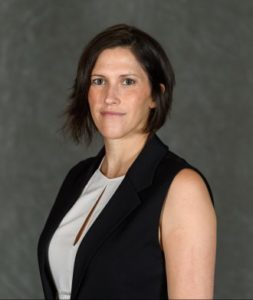
Dr. Clare Fieseler (SFS ’06) holds a Ph.D. in ecology from the University of North Carolina Chapel Hill’s College of Arts and Sciences. She returns to a familiar program, having been a STIA major at SFS for undergrad. Over the course of her career, Fieseler has combined science and storytelling through her work as a marine ecologist and photographer. After graduating from the SFS, Fieseler worked in wildlife film production for National Geographic Television before completing a master’s in coastal environmental management at Duke University. In 2015, she became the youngest female scientist represented by National Geographic Creative, and she has produced media for National Geographic, The Atlantic, Undark, and NPR.
Sharat Ganapati
Assistant Professor of International Economics
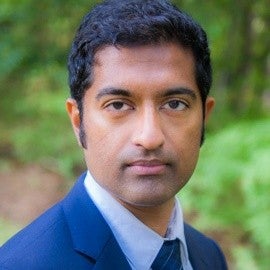
Dr. Sharat Ganapati, Assistant Professor of International Economics, received his BS and BA in economics from the University of Chicago, and both a Master’s and a Ph.D. in economics from Yale University. He formerly taught at Dartmouth University as an international economics fellow. He specializes in the study of global megafirms, focusing on the ways they are formed and how they participate in economies. “Economics is infused in nearly all global relationships,” says Ganapati about his field. “I’m hoping to both teach and learn from SFS students about the links between economics and our integrated world.”
In addition to teaching, Ganapati is particularly excited about working with his future SFS colleagues. “I’m looking to be part of broad interdisciplinary conversations at the SFS on the past, present, and future of globalization. As an economist, we’ve often overlooked the distributional and political consequences of global integration. I hope to correct these issues at a place like the SFS.” Ganapati is particularly interested in how policy can react to economics and globalization: “The global economic landscape is quickly changing, but we know remarkably little on the consequences of our actions. I hope to not only shed light on the outcomes of past and current policies but also design new and better policies.”
Kevin Martin
Assistant Teaching Professor — Center for Contemporary Arab Studies
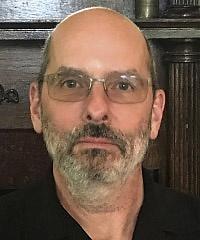
Dr. Kevin Martin (MAAS‘00, PHD‘05) holds a Ph.D. in history of the Middle East and North Africa from Georgetown University. He joins the SFS from his work as a member of the School of Historical Studies at the Institute for Advanced Study.
Martin is a cultural historian of modern Syria. Over the coming year, he hopes to complete a draft of his second book, provisionally entitled “We Have Discovered America!”: The United States in the Syrian Imagination, 1946-1963.
Evan Medeiros
Penner Family Chair in Asian Studies
Cling Family Senior Fellow in US-China Relations
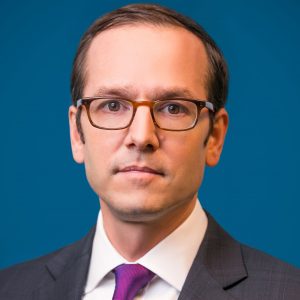
Dr. Evan Medeiros joins the SFS from the Eurasia Group, a New York-based political risk consulting firm, where he was the managing director of Asian affairs. Medeiros formerly served on the National Security Council as special assistant to President Barack Obama and senior director of Asian affairs. He has a Ph.D. in international relations from the London School of Economics and Political Science, a master’s degree in the same from the University of Cambridge, another master’s degree in China studies from the University of London’s School of Oriental and African Studies, and a bachelor’s degree in analytic philosophy from Bates College. Medeiros expressed his excitement for what Georgetown has to offer: “I am most excited about the inherently interdisciplinary nature of the SFS in the faculty, the curriculum, and the students. The mix of area studies and functional studies – such as Asia and security studies – is unique to SFS, and it is essential to preparing students for contemporary global affairs.”
Medeiros specializes in Chinese foreign and security policy, specifically with regards to U.S.-China relations. “From different perspectives, my work has examined and elucidated the sources and patterns of change in China’s foreign and defense policies and specifically the role that U.S. policy had in shaping China’s choices,” says Medeiros, “I was able to put many of my ideas and theories into action while advising President Obama when I served for six years on the staff of the National Security Council. I bring this combination of substantive expertise and real-world policymaking to my teaching and research at SFS… I have many goals for my time at SFS, and they all center around the idea of building SFS into a center of excellence on China’s role in the world and its impact on international affairs.”
Paul Miller
Professor of the Practice and Concentration Chair for Global Politics and Security — Master of Science in Foreign Service
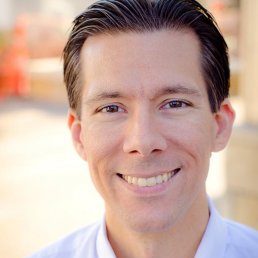
Dr. Paul Miller (COL’99, SSP’10, PHD’10) holds a Ph.D. in international relations from Georgetown University, where he also obtained his bachelor’s and master’s degree. “I am excited to be back at Georgetown, my alma mater, and to give back some of what it has given me over my life,” Miller says.
Miller comes from working as Associate Director at the University of Texas Clements Center for National Security. His research focuses on grand strategy, U.S. national security policy, the intelligence community, stability operations, just war, and related issues. Currently, he is working on books on the war in Afghanistan and on the history of the just war tradition, and another writing project on religion and American nationalism. While he hopes to work on these projects while at MSFS, he is really looking forward to getting to know the students. “Their extraordinary eagerness, intelligence, and drive is an inspiration and a challenge to be the best teacher and mentor I can be for them,” Miller says. “I hope to impart some bit of helpful knowledge and wisdom to them while they’re here, and, of course, help them get jobs!”
Rebecca Patterson
Professor of the Practice of International Affairs and Associate Director — Security Studies
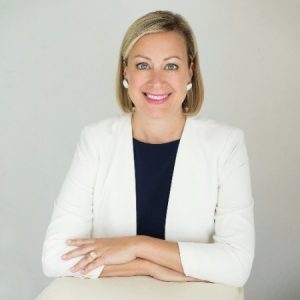
Georgetown will be Dr. Rebecca Patterson’s first experience working full time at a civilian university. She previously served as Associate Dean for Curriculum and Faculty Development at National Defense University’s College of International Security Affairs. Patterson holds a Ph.D. in public policy and national security policy from the George Washington University, and her research has focused on post-conflict reconstruction in terms of both military innovation for nation-building and moving to sustainable peace. “I remain interested in exploring the intersection of security and development, which I hope to further explore while with the SFS,” Patterson says.
Patterson also looks forward to mentoring students at SFS. “The students are phenomenal—they are curious, hard working, ambitious, and eager to improve themselves,” Patterson says. About her fellow faculty members, she says, “Every day I have the privilege of working with the best and the brightest in the field; not only are they brilliant, but extremely collegial.” Patterson also feels strongly about the Georgetown motto of cura personalis—care for the whole person. “We are all more than our professional lives and it’s great to work at an institution that embraces all facets of the human experience,” Patterson says.
As Associate Director of SSP, Patterson hopes to strengthen and build the program. “One of my goals is to think strategically about how to ensure SSP remains the top security studies program in the country and to take proactive steps to make certain that it does.”
Philipp Renczes, S.J.
Jesuit Chair and Visiting Professor — Center for Jewish Civilization
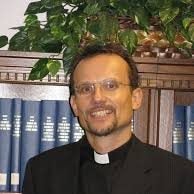
Dr. Philipp Renczes, S.J. holds a Ph.D. in history of religion and religious anthropology from Universite Paris-Sorbonne and a Doctorate in theology from Institut Catholique de Paris. Renczes will bring to the Center for Jewish Civilization a wealth of interreligious experience, having served as the director for Jewish Studies and the Jewish-Catholic Dialogue at the Gregorian University in Rome. “I have engaged in exploring the potentialities of the Jewish-Catholic Encounter, especially with the renewed Catholic Theology regarding Interreligious Dialogue,” Renczes sais. “So I am very excited to be able to teach a class at the SFS on Implications on Culture of the Jewish-Christian Encounter.”
Another theological trend that Renczes hopes to engage with is the gap between historical theology and systematic theology in theological research. “For years I have been playing with the idea to create a kind of fictitious dialogue between Augustine and present day theologians grappling over the question of how to join ‘Human Freedom’ with ‘God’s Grace,’ the latter indeed signifying God’s true impact on human life and, possibly, even personal decision-making,” he said. “I hope to be able to advance with this project here [at Georgetown] to a greater degree, so that there should be a book coming out not too far down the road…”
Renczes also looks forward to becoming part of the Georgetown community and engaging with students and colleagues. “Indeed, there is something like the ‘Spirit of Georgetown,’ which can be translated as the awareness of being part of a wonderful place of various minds to meet and new perspectives to open up,” he said.
Jessica Roda
Assistant Professor of Jewish Civilization
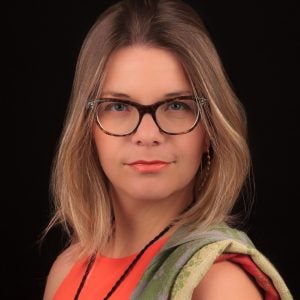
Dr. Jessica Roda comes to the Hilltop from McGill University in Canada, with a master’s in music and musicology from Sorbonne University, and a Ph.D. in ethnomusicology from both Sorbonne and the University of Montreal. Her work revolves around the politicization of Jewish artists in the public space, specifically how Jewishness engages with global politics, international cultural policies, and minority rights. “Teaching about the political implication of the arts to future leaders of international affairs is extremely motivating,” says Roda of her excitement about joining the SFS. “It is particularly important to me to be able to make a difference in the life of my students, giving them the tools to assess society with a critical eye.”
Roda has big plans for her research. “At the SFS, I will pursue two main research projects,” says Roda, “First, I will continue my research on the revival of Jewish artists in Morocco. With this project, I hope to create new collaborations between SFS and institutions in Morocco and its diaspora. The second project, which I commenced in 2015, is based on an ethnography of Ultra-Religious Jewish life in New York and Montreal, where I work on the role of Hasidic artists (musicians, painters, and performances) in the transformation of the boundaries between the secular and the religious world.”
Elizabeth Saunders
Associate Professor — Security Studies
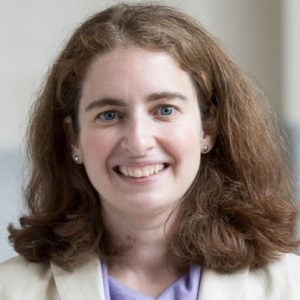
Dr. Elizabeth Saunders was an associate professor of political science at George Washington University before taking on the same position in the SFS as a core faculty member of the Security Studies program. Saunders holds a Ph.D. with distinction from Yale University in political science, as well as a master’s degree in international relations from the University of Cambridge and an undergraduate degree in astrophysics from Harvard.
“I am really happy to be here,” said Saunders of her new job. “I am very excited to be part of such a large and diverse community of scholars studying international affairs from a variety of perspectives.” Saunders’ primary academic focuses are international security and U.S. foreign policy, including the presidency and foreign policy, and the politics of using force. “Much of my work has explored the role of leaders in international politics,” Saunders said about her expertise, “I also write on the presidency and foreign policy, and have published and have forthcoming work on why presidential foreign policy experience matters, and the politics of presidential advisers.”
Caitlin Talmadge
Associate Professor — Security Studies
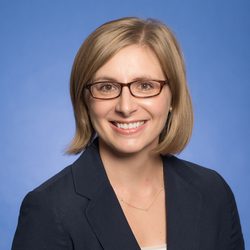
Dr. Caitlin Talmadge, like her colleague Saunders, isn’t moving very far – she also comes to the SFS from George Washington University, where she served as Assistant Professor of political science and international affairs. Talmadge earned her Ph.D. from the Massachusetts Institute of Technology after graduating from Harvard with a bachelor’s degree in government. “I am really excited to work with the students here,” Talmadge says. “Some of my best friends are SFS grads, so I’ve always had a really positive impression of Georgetown students. Now that I’m here, I am looking forward to getting to teach both undergrads and grads, as well as to having opportunities for one-on-one advising and collaboration on research projects. In addition to all that, I’m of course looking forward to joining the world-class SFS faculty, participating in campus life, and having such a supportive research environment.”
Talmadge has big plans for her research at Georgetown. “All of my research relates to the politics surrounding the use of force… Currently, I am working on several projects related to deterrence and escalation, particularly the question of how to prevent nuclear escalation in conventional wars between nuclear-armed states. I’m interested in this question because I think if the United States today were to become involved in a conflict with a nuclear-armed state such as North Korea, Russia, or China, that war would look very different from the sort of conflicts the United States has fought since the end of the Cold War, all of which involved opponents such as Serbia, Iraq, and Afghanistan, that lacked nuclear weapons.” Her expertise lies in U.S. defense policy and how emerging technologies such as cyber, autonomous weapons, and hypersonic vehicles fit into this picture and might affect deterrence in the future.
Christian Wagner, S.J.
Assistant Teaching Professor
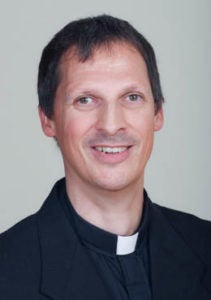
Dr. Christian Wagner, S.J. holds a Ph.D. in microbiology from Biocenter University, with particular interest in the intersection of scientific research and faith. He will be advising the Global Experiences program and teaching one undergraduate science class.
Wagner appreciates how the SFS engages with international relations from multiple angles: scientific, humanistic as well as economic. His own background has reflected such a diversity of experience, with a scientific background in chemical engineering, biotechnology and pharmaceutical research. His humanistic background has focused on inter-religious dialogue in education, particularly in the context of Confucian Asian thought. “I am looking forward to use this experience in order to help students to engage their academic studies in concrete projects in international settings that require not only knowledge but also rely on character formation through the humanities,” he says.
Wagner is excited about the multitude of opportunities found at SFS. “SFS offers such a splendid collection of resources that applying and using them appears as if drinking from a water hose.” Helping to create even more opportunities for students, Wagner is working on integrating SFS courses with global experiences. “This academic framework will allow students to test, apply and contribute their academic knowledge to international projects and topics such as refugees and migration or natural resources and trade,” Wagner explains. Handling the logistics end, he says this framework will allow more students to participate in international experiences. Additionally, he is preparing courses in the STIA program that integrate biological science and international travel and the importance of energy supplies for environmental and social concerns.
Cynthia Wei
Associate Teaching Professor — Science, Technology, and International Affairs
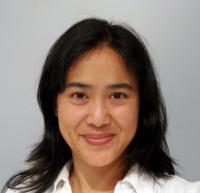
Dr. Cynthia Wei holds a Ph.D. in zoology and ecology, evolutionary biology, and behavior from Michigan State University, and was previously Associate Director of Education at the National Socio-Environmental Synthesis Center. She is also a section co-editor for the journal Case Studies in the Environment. While her previous scientific research has focused on animal cognition, at SFS she will be expanding and building on her more recent experiences. “In particular, I have been working on issues related to interdisciplinary teaching and teaching with case study methods, and I plan to continue that work here,” Wei says.
Wei expresses her excitement about joining the SFS community. “I’ve only been here a few weeks, but I can already tell that SFS students are very engaged and motivated, as are the faculty,” she says. “The passion is contagious!” While at SFS, she hopes to demonstrate to new students—who are no longer “Safe From Science”—the relevance and importance of science in understanding our world today. “One of my main goals is to change the perception amongst some incoming students that science is not relevant to their careers and that they do not need to understand science,” Wei says.
